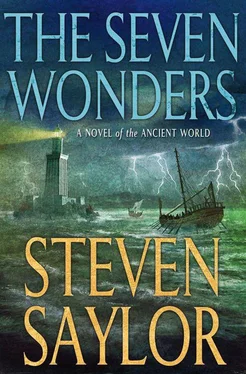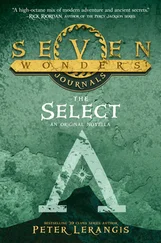Steven Saylor - The Seven Wonders
Здесь есть возможность читать онлайн «Steven Saylor - The Seven Wonders» весь текст электронной книги совершенно бесплатно (целиком полную версию без сокращений). В некоторых случаях можно слушать аудио, скачать через торрент в формате fb2 и присутствует краткое содержание. Год выпуска: 2012, Издательство: Macmillan, Жанр: Исторический детектив, на английском языке. Описание произведения, (предисловие) а так же отзывы посетителей доступны на портале библиотеки ЛибКат.
- Название:The Seven Wonders
- Автор:
- Издательство:Macmillan
- Жанр:
- Год:2012
- ISBN:нет данных
- Рейтинг книги:4 / 5. Голосов: 1
-
Избранное:Добавить в избранное
- Отзывы:
-
Ваша оценка:
- 80
- 1
- 2
- 3
- 4
- 5
The Seven Wonders: краткое содержание, описание и аннотация
Предлагаем к чтению аннотацию, описание, краткое содержание или предисловие (зависит от того, что написал сам автор книги «The Seven Wonders»). Если вы не нашли необходимую информацию о книге — напишите в комментариях, мы постараемся отыскать её.
The Seven Wonders — читать онлайн бесплатно полную книгу (весь текст) целиком
Ниже представлен текст книги, разбитый по страницам. Система сохранения места последней прочитанной страницы, позволяет с удобством читать онлайн бесплатно книгу «The Seven Wonders», без необходимости каждый раз заново искать на чём Вы остановились. Поставьте закладку, и сможете в любой момент перейти на страницу, на которой закончили чтение.
Интервал:
Закладка:
It seemed that the entire world had contracted to a single, swirling vortex, and I stood in the very center of it.
That was when Antipater saw the look on my face and asked if I had ever seen or even imagined such a spectacle-the crowded, chaotic festivity of Olympia on the eve of the Games-and I could only shake my head in wonder, admitting by my silence that I had not.
Continuing to make our way through the throng, we came to a group of spectators who stood in a compact circle. From their bursts of laughter I assumed quite a funny mime show was being performed-or perhaps not, for the laughter had a derisive edge to it and was peppered with catcalls and scoffing noises. Some of the spectators turned away and stalked off, shaking their heads and making faces. Antipater and I slipped into their spots to see what the fuss was about.
The tall man who was holding the crowd’s attention was barefoot and dressed in beggar’s rags, with long, scraggly hair and a beard that might have concealed a bird’s nest or two. His naked limbs were long and spindly. His skin, dark and leathery from long exposure to the sun, made his blue eyes all the more startling, especially since he maintained a wide-eyed stare that showed circles of white all around.
“Fools!” he shouted, shaking a gnarled walking stick in his equally gnarled fist. “You say you come here to honor Zeus, but all you honor is your own appetites. Those you truly worship are not the gods, but the athletes who compete for your amusement-the stupidest and most worthless among you!”
“If the Games are so stupid, what are you doing here, you old fool?” someone shouted back at him.
“Just as a good doctor rushes to help in places full of the sick or wounded, so the wise man must go where idiots gather,” declared the beggar.
“Ugh!” exclaimed Antipater. “The man is a Cynic, here to spoil everyone’s enjoyment.”
“Ah! So that’s what a Cynic looks like.” I had heard of these itinerant philosophers, who cared nothing for personal comfort (or hygiene) and went about loudly disparaging all the things that gave their fellow mortals pleasure. According to Antipater, Cynics were common in the Greek-speaking world, but I had never seen one in Rome, where it was hard to imagine that such antisocial gadflies would ever be tolerated.
A man in a green chiton spoke up. “How dare you come here, to the most sacred of all the Games, and speak against the athletes? What gives more pleasure to the gods than beauty, and what could be more beautiful than the sight of young men running in competition? I put it to you that running is the most noble of mortal pursuits.”
“What you’re really saying is that you get a thrill from watching all those naked, straining backsides,” said the Cynic. The crowd laughed and the object of his derision blushed bright red. “What’s so noble about running, anyway? The rabbit and the antelope are the fastest of creatures-and the most timid! Do you think Zeus gives a whit which coward can flee the fastest?”
This elicited more jeering. In Rome, the crowd would have pelted the fellow with bits of food, or even with stones. But though they sneered and shook their heads, no one raised a hand against the Cynic or made any effort to silence him. Just as the Greeks worship athletes, they also respect the free speech of philosophers-even Cynics.
I turned to Antipater and lowered my voice. “The fellow does have a point.”
“What do you mean?”
“Well, what is all this fuss about who can run the fastest, or throw a stick the farthest, or keep on throwing punches after his head’s a bloody pulp? The idea that all these tens of thousands of people should travel hundreds of miles just to watch some athletic competitions-it’s all a bit silly, isn’t it?”
Antipater looked at me as if I had uttered a shocking blasphemy. “I suggest you keep those thoughts to yourself, Gordianus. A Cynic can get away with saying such things, but a visitor from Rome is expected to show more respect.”
“But surely you’re not like these others, Teacher? You’re a poet. What have you to do with running and jumping and throwing?”
Antipater simply stared at me. I had forgotten how very Greek he was-and how passionately all Greeks love athletics. Cynics are the only exceptions.
“You can take the boy out of Rome…,” Antipater muttered, shaking his head. Then he stiffened as the Cynic suddenly rushed up to him.
“You! One-eye!” shouted the Cynic. “Don’t I know you?” He twisted his head this way and that, crouching low and peering up at Antipater, as if trying to see under the eye patch.
“I think not.” Antipater drew back, looking flustered. All eyes were on him now. “Who are you, Cynic?”
“I am Simmius of Sidon. And who are you ? And how did you lose that eye?”
“That is none of your business. But if you must know, I am Zoticus of Zeugma.”
“And who’s this young fellow?” The Cynic turned to me. The odor of his unwashed body was overpowering. “Is this one of the athletes who’ll be competing tomorrow? He has a boxer’s nose-a wrestler’s arms-a discus thrower’s chest. A candidate for the pankration, perhaps?”
As Antipater had informed me, the pankration was the most brutal of Greek combat sports, invented by Hercules and Theseus. It was a combination of boxing and wrestling with no holds barred; broken bones and even fatalities could result.
“My name is Gordianus,” I declared, straightening my back. Of Rome, I was about to add, but there was no need, since the Cynic spotted my accent at once.
“What’s this? A Roman, taking part in the Games?”
I shook my head. “I’ve come to see the statue of Zeus-”
Ignoring my answer, the Cynic turned to the crowd and launched into a fresh rant. “From the beginning, and for hundreds of years, only those of Greek descent could compete in the Olympiad. Now, to please our Roman overlords, there’s talk of allowing anyone who can simply speak Greek to take part in the Games-even Romans! What’s next? Shall we open the Olympiad to competitors from all over the world, so foreigners can boast and spit on the ground and erect statues of themselves in the Sacred Grove of Zeus?”
Simmius abruptly wheeled around, ran back to Antipater, and resumed his scrutiny. “But I could swear I know you. What’s this thing?” He reached out with two fingers, and I realized he was about to pinch Antipater’s putty nose, which had lost some of its shape under the fierce sun and was looking a bit peculiar.
“Come away, Teacher!” I grabbed Antipater’s arm and pulled him out of the Cynic’s reach. “I’ve had enough of this fellow’s rancid odor.”
The Cynic peered after us for a while, then turned back to his audience and resumed his diatribe.
“Simmius of Sidon, the fellow calls himself. That’s your hometown, Teacher. Does he know you?”
Antipater shrugged. “A man meets many people over the course of a long lifetime. One can’t remember them all.”
“He might look very different if he were to take a bath and trim his beard. But surely you wouldn’t forget those blue eyes. They’re quite striking.”
Antipater shook his head. “Who can remember anything, in this stifling heat? Come, let’s find our quarters for the night.”
“And where would that be?”
“We must look for the tent that’s been pitched by a man named Exagentus.”
We asked around, and soon enough were directed to an area not far from the stadium. I had been expecting a modest accommodation where we might stow our things and later bed down with others in cramped quarters, but the tent of Exagentus turned out to be one of the grander pavilions, a veritable palace of many rooms made of brightly colored canvas held up by ornately carved poles. Exagentus was not about, but a slave who had been told to expect Zoticus of Zeugma greeted us and allowed us to enter, asking us first to remove our shoes. The ground inside the tent was strewn with rugs that felt delightfully soft under my tired feet. The slave showed us to a small side chamber and informed us we would have it all to ourselves. The space contained two narrow cots for sleeping. Between them was a small table with a silver pitcher filled with water and two silver cups. Next to one of the cots a flap opened to the outside, so that we could come and go as we pleased.
Читать дальшеИнтервал:
Закладка:
Похожие книги на «The Seven Wonders»
Представляем Вашему вниманию похожие книги на «The Seven Wonders» списком для выбора. Мы отобрали схожую по названию и смыслу литературу в надежде предоставить читателям больше вариантов отыскать новые, интересные, ещё непрочитанные произведения.
Обсуждение, отзывы о книге «The Seven Wonders» и просто собственные мнения читателей. Оставьте ваши комментарии, напишите, что Вы думаете о произведении, его смысле или главных героях. Укажите что конкретно понравилось, а что нет, и почему Вы так считаете.










